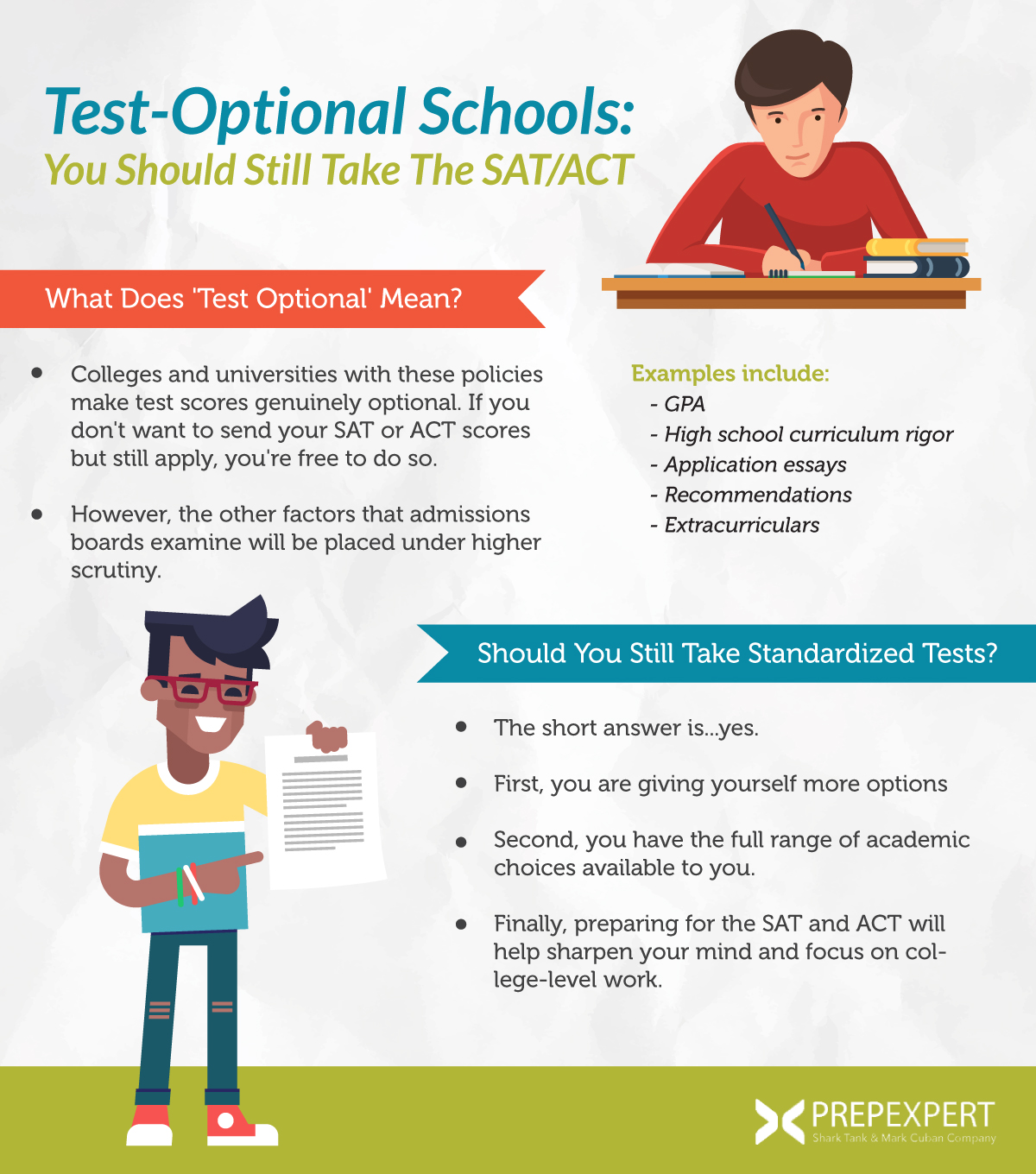Test-Optional Schools: You Should Still Take The SAT/ACT
In light of the college admissions scandal and other factors, test-optional schools have gained steam. Many pundits believe that standardized tests have outlived their usefulness. However, there are still good reasons to take these tests.
More colleges and universities today are becoming test-optional schools; learn why and how taking either the SAT or ACT will still benefit you.
Learn how to prepare for standardized tests with our year-round SAT prep and ACT prep courses today before having to take either test.
What Does ‘Test Optional’ Mean?
There are institutions out there that let you off the hook with standardized tests.
Colleges and universities with these policies in place make test scores genuinely optional. If you don’t want to send your SAT or ACT scores there but still apply, you’re free to do so. This doesn’t mean that you’re banned from submitting your scores.
If you do well on either the SAT or ACT, you’re more than welcome to send them in for consideration. However, you need to understand that just because they don’t require test scores that you’re completely off the hook.
In their place, you might have to submit other materials. For example, you may have to submit additional writing samples or other documentation. More importantly, the other factors that admissions boards examine will be placed under higher scrutiny.
Examples include:
- GPA
- High school curriculum rigor
- Application essays
- Recommendations
- Extracurriculars
Each one will count far more than normal. If you have any deficiencies in those areas, they’ll be magnified at a test-optional school.
Why Test-Optional Schools Are Growing
The fear of test scores sinking application hopes is real for students.
So much pressure is placed on high school students about their SAT and ACT scores that plenty of them buckle under pressure. It doesn’t have to be that way though.
Remember though that your test score alone doesn’t guarantee an automatic pass into your dream school. From an admissions officer perspective, achieving a perfect score at the expense of other application components can hurt your overall chances.
Examples of these components include:
- Ignoring all extracurriculars
- Writing a poor essay
- Avoiding academic challenges in high school like AP classes
More schools adopting the test-optional philosophy choose to examine a student’s transcripts and curriculum with greater intensity than before. They’re more interested in seeing how difficult your classwork was over time, and if you challenged yourself.
For example, if you decided to tackle AP classes during your junior and senior years, and did alright in them, that effort will carry weight in your favor.
Should You Still Take Standardized Tests?
The short answer is…yes. But let’s explain why.
There are three major reasons to still take the SAT or ACT if you’re considering test-optional schools.
First, you are giving yourself options. Understand that if you choose to ignore taking either test, then you’re literally putting all of your eggs into one basket.
While more schools are adopting test-optional policies, not everyone is joining in. More importantly, applying to a test-optional school doesn’t mean you’ll automatically get in. These institutions can be more rigorous in their assessments because they have fewer factors to consider.
Second, you have the full range of academic choices available to you. If you take the time to balance out test studying with your extracurriculars and other application tasks, then you’ll be in great shape for admission boards.
Every school will be an option. In that case, if you want to apply to some test-optional ones as backups just in case, then go ahead. You then know that your bases are better covered by putting both kinds of schools: test-optional and test reliant, into play.
Finally, preparing for the SAT and ACT will help sharpen your mind and focus on college-level work. Working on the Essay sections alone will prep you for what college papers will entail. Furthermore, those tests are designed to show schools how ready you are to handle college-level work and pressure.
For more test strategy, college admissions, and scholarship application tips sign up for our FREE class happening right now!
Test-Optional Schools FAQ
What are ‘test-optional schools’?
Colleges and universities with these policies in place make test scores genuinely optional. If you don’t want to send your SAT or ACT scores there but still apply, you’re free to do so. This doesn’t mean that you’re banned from submitting your scores.
If a school is test-optional, will I get in trouble for sending my scores?
If you do well on either the SAT or ACT, you’re more than welcome to send them in for consideration.
What do test-optional schools use to evaluate applicants?
You may have to submit additional writing samples or other documentation. More importantly, the other factors that admissions boards examine will be placed under higher scrutiny. Examples include – GPA, High school curriculum rigor, Application essays, Recommendations, and Extracurriculars.
Should I still take the SAT or ACT?
Yes. You are giving yourself the full range of options. While more schools are adopting test-optional policies, not everyone is joining in. More importantly, applying to a test-optional school doesn’t mean you’ll automatically get in. These institutions can be more rigorous in their assessments because they have fewer factors to consider.
